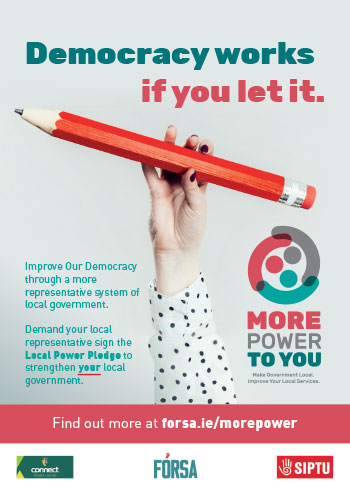The recently launched campaign by three of our largest trade unions—SIPTU, Fórsa, and Connect—is to be welcomed. Under the slogan “More Power to You,” it is asking voters to take the local power pledge: “I believe in local government.”
This is a pledge to use your vote in the coming local elections to support five demands adopted by the trade unions to strengthen local government and improve services for all. They are asking politicians to make the pledge, and for citizens to vote for those candidates who support it.
The five demands are:
- Democracy: Introduce directly elected mayors and new, adequately financed town councils.
- Waste: Establish a regulator for household waste collection, and enable local authorities to re-enter bin collection services.
- Water: Hold a referendum on enshrining the public ownership of water in the Constitution of Ireland.
- Housing: Establish a new local authority public housing model, and increase investment in existing local authority maintenance and retrofitting schemes.
- Energy: Enable local authorities to lead micro-generation and community ownership of renewable energy projects, and establish a primary role for local government in setting carbon reduction targets and the promotion and education of low-carbon transition.
It’s about time that unions began to lead the fight back against austerity and the neo-liberal race to the bottom. These demands are a step in the right direction; but they need to go further in some areas. For example:
Waste: Refuse collection should be remunicipalised. Polluters should be made to pay. Most unions already have a policy against the privatisation of state utilities; the reversing of privatisation should now be demanded.
Water: The referendum on water should be for the public management and ownership of water. The right to water should also be included.
Housing: The cost-rental model is not a solution to the housing crisis, as rents under this system come in at about 25 per cent less than a mortgage, i.e. €1,500 a month, instead of €2,000 for an average family home. A universally accessible public housing service with income-linked rents is the permanent solution. How could people on a pension afford €1,500 a month? A right to housing in the Constitution has already been demanded by the ICTU.
It’s a welcome development for the trade union movement to be pushing political demands in the elections, as the social wage has been abandoned by the political class. If the trade union movement is ever to regain the density it once had, it must go much further than looking for solutions within the neo-liberal budget.
After ten years of “austerity,” workers are well aware of their predicament, whether it is the housing crisis, precarious work, the two-tier health service, or any of the other things that stop them reaching their full potential. With nowhere left for ordinary working people to turn, the unions must lead the fight back, as they did in the Right2Water campaign.
Demands must go far beyond what the establishment is willing to concede, to demands that will transform the lives of working people. Otherwise unions are just another branch of the establishment.
Workers are still workers when they walk out the factory gates. They need to know that the trade union movement has their back.
The crisis in housing, health, wages and employment did not just happen: it was caused by the Government enforcing “austerity” and the neo-liberal agenda, at the behest of big business and the EU. Low pay, precarious work and cuts to services have led to increased inequality and to levels of poverty not seen for many years. This has coincided with a massive decline in trade union density, and is inextricably linked to it.
Half of all workers earn less than €30,000 a year. Half of all women workers earn less than €22,000 a year. The gloves need to come off; the time for “moderate” demands and half-baked measures is long since past. Workers and their unions must push demands much further, to the demand for a universal right to housing, health and education for all citizens to be enshrined in the Constitution.
Trade unions must regain power, strength, and density. All anti-union legislation must be abolished, allowing workers to have control over their own activity, to decide when and what actions unions take to win back losses and to fight new battles. We must fight for the right to union recognition, the right to union access, and full collective bargaining rights for all workers.
As it stands, half of all union members are over the age of forty, and fewer young people are joining unions, being trapped in minimum-hours and short-term contracts. If this trend continues, the writing is on the wall for trade unions.
Why are young people, despite having some of the worst working conditions for generations, not joining unions? Is it because trade unions are not seen as radical any more, as they were when first founded by the likes of Larkin and Connolly?
We must learn from history. Trade unions were born out of struggle: the struggle for workers to have decency and dignity in their lives. Unions must lead from the front. Trade unions now have to become radical or redundant.
In the words of James Connolly, our demands most moderate are: we only want the earth.






